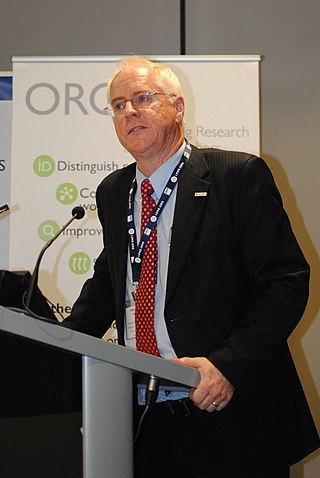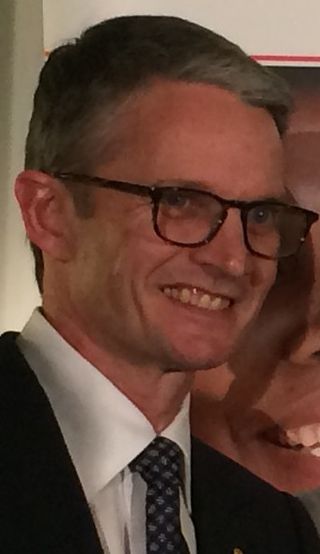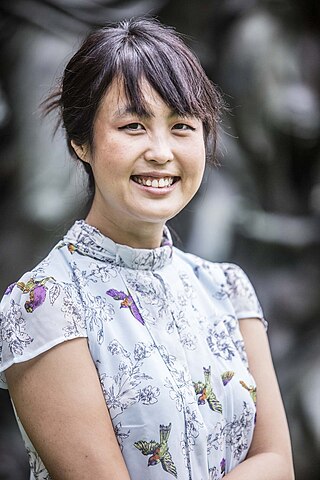Related Research Articles

Keith Alexander Nugent FAA is an Australian physicist. He is Emeritus Professor of Physics at the Australian National University (ANU) in Canberra.
Amanda Susan Barnard is an Australian theoretical physicist working in predicting the real world behavior of nanoparticles using analytical models and supercomputer simulations and applied machine learning. Barnard is a pioneer in the thermodynamic cartography of nanomaterials, creating nanoscale phase diagrams relevant to different environmental conditions, and relating these to structure/property maps. Her current research involves developing and applying statistical methods and machine/deep learning in nanoscience and nanotechnology, and materials and molecular informatics. In 2014 she became the first person in the southern hemisphere, and the first woman, to win the Feynman Prize in Nanotechnology, which she won for her work on diamond nanoparticles.

Douglas James Hilton is an Australian molecular biologist. He is the CEO of CSIRO and immediate past Director of the Walter and Eliza Hall Institute of Medical Research in Melbourne, Australia. His research has focused on cytokines, signal transduction pathways and the regulation of blood cell formation (hematopoiesis). Hilton was the President of the Association of the Australian Medical Research Institutes (AAMRI) from 2014-16.

Brendan Scott Crabb is an Australian microbiologist, research scientist and director and chief executive officer of the Burnet Institute, based in Melbourne, Victoria, Australia.
Sandra Eades is a Noongar physician, researcher and professor, and the first Aboriginal medical practitioner to be awarded a Doctorate of Philosophy in 2003. As of March 2020 she is Dean of Medicine at Curtin University.
Bernadette McSherry is a lawyer, writer and Emeritus Professor at the University of Melbourne. She is a Fellow of the Academy of Social Sciences in Australia, Fellow of the Australian Academy of Law and a Commissioner with the Victorian Law Reform Commission.

Katharina Gaus was a German-Australian immunologist and molecular microscopist. She was an NHMRC Senior Research Fellow and founding head of the Cellular Membrane Biology Lab, part of the Centre for Vascular Research at the University of New South Wales. Gaus used new super-resolution fluorescence microscopes to examine the plasma membrane within intact living cells, and study cell signalling at the level of single molecules to better understand how cells "make decisions". A key discovery of Gaus and her team was how T-cells decide to switch on the body's immune system to attack diseases. Her work is of importance to the development of drugs that can work with T-cells in support of the immune system.

Josephine Forbes is an Australian scientist specialising in the study of glycation and diabetes. She has been studying diabetes since 1999 and has worked at Royal Children's Hospital, University of Melbourne and Baker Heart and Diabetes Institute in Melbourne Australia. Since 2012 she has led the Glycation and Diabetes team at Mater Research which is a world-class medical research institute based at South Brisbane, and part of the Mater Group. Josephine is program leader for Mater's Chronic Disease Biology and Care theme, building greater understanding of the biological basis of a broad range of chronic diseases, and developing preventative strategies and innovative treatments to improve patient outcomes. Josephine and her team focus on how advanced glycation contributes to the pathogenesis of diabetes and its complications such as kidney disease.

Emma Letitia Johnston is the Deputy Vice Chancellor (Research) at the University of Sydney. She was former, Dean of Science at the University of New South Wales and President of Science & Technology Australia. She is an authority in marine ecology and a former Pro Vice-Chancellor (Research) at UNSW. From February 2025, she has been appointed Vice Chancellor of the University of Melbourne.
Aleksandra Filipovska is an Australian biochemist and molecular biologist. She is a professor, Deputy Director of the ARC Centre of Excellence in Synthetic Biology and NHMRC Investigator at the University of Western Australia, heading a research group at the Telethon Kids Institute. Specializing in biochemistry and molecular biology, she has made contributions to the understanding of human mitochondrial genetics in health and disease.
Professor Sandra Rees is an Honorary Professorial Fellow in the Department of Anatomy and Neuroscience at the University of Melbourne. Her major research interests have been directed towards understanding the pathogenesis of brain injury resulting from fetal hypoxia, infection, alcohol exposure, growth restriction and prematurity.
Eroia Barone-Nugent is an Australian science educator. Barone-Nugent is experienced with secondary science teaching, science, and education research and she is an education program leader and innovator. She leads the Growing Tall Poppies Science Partnership Program. She is funded by the Australian Government's 'Australian Mathematics and Science Partnership Program' (AMSPP). The goal of her program is to increase the number of students, especially girls, studying science and particularly physics to year 12 and beyond. Barone-Nugent currently holds a part-time academic role at the Australian University, Canberra, CPAS where she is investing in developing curriculum material to support and encourage young children in early primary school to be curious about science and consider science careers. She continues to make practical and meaningful contributions to the pursuit of and equal access for girls in science.

Jee Hyun Kim is an Australian behavioral neuroscientist whose work focuses on emotional learning and memory during childhood and adolescence. She is a professor, ARC future fellow, and head of the Molecular Psychiatry Laboratory at the Deakin University School of Medicine, Australia

Ian Murray Wanless is an Australian mathematician. He is a professor in the School of Mathematics at Monash University in Melbourne, Australia. His research area is combinatorics, principally Latin squares, graph theory and matrix permanents.
Sarah Elizabeth Medland is Professor and Psychiatric Genetics Group Leader at the QIMR Berghofer Medical Research Institute in Herston, Brisbane, Australia. She played a major role in the development of the ENIGMA brain imaging consortium.

Ranjith Pathegama Gamage, a Fellow of the Australian Academy of Technology and Engineering, is an Australian academic based at Monash University, where he holds the position of Professor in Geomechanics Engineering. His research has significantly influenced understanding of the Carbon sequestration. He has also developed new sustainable technologies for extracting resources from deep earth and natural gas from coal seams, shale, and tight geological formations.
Margot Ruth Prior was an Australian psychologist, educator, and musician. She was professor of psychology at the University of Melbourne where her research focused on autism and literacy development. She was also director of psychology at the Royal Children's Hospital and was adjunct professor at La Trobe University.
Professor Ute Roessner is a biochemist who specialises in plant metabolomics. Until 2022, she has been professor and head of the School of Biosciences at the University of Melbourne. In 2022, she joined The Australian National University in Canberra, Australia.

Sarah Perkins-Kirkpatrick is an Australian climate scientist and expert in heatwave research. She was awarded a NSW Young Tall Poppy in 2013 and received the Dorothy Hill award in 2021. She has extensive science communication experience.
Ailie Gallant is an Australian climate scientist and expert in drought and precipitation variability research. She was awarded the Dorothy Hill Medal by the Australian Academy of Science in 2024, experience in science communication.
References
- 1 2 3 Scott, Rebecca. "Australia's Hot Underbelly". news.unimelb.edu.au. University of Melbourne News. Retrieved 14 August 2014.
- ↑ "Sandra McLaren". Earth Science - University of Melbourne. Retrieved 13 April 2022.
- ↑ "Dr Sandra McLaren - Tall Poppies - 2008 Victorian Award Winners". Australian Institute of Policy and Science. Retrieved 22 April 2015.
- ↑ "Awardees for 2008 - Academy Medal". Australian Academy of Science. Archived from the original on 11 March 2015. Retrieved 22 April 2015.
- ↑ Maslen, George (16 March 2009). "Tapping into a core promise". The Age. Retrieved 14 August 2014.
- ↑ "Sandra McLaren". globalyoungacademy.net. Retrieved 17 December 2020.